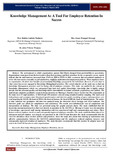Knowledge Management As A Tool For Employee Retention In Saccos

View/
Date
2018-03Author
Bulitia, Godrick
Wanjala, John W.
Mwangi, Grace W.
Metadata
Show full item recordAbstract
The environment in which organizations operate has clearly changed from predictability to uncertainty. Organizations want more from the best workers than their presence and their retention. In the co-operative sector, reports indicate that the staff turnover increased from 15.6% in 1999 to 19.2% in 2001, a concern that necessitated employers to review the root causes especially on job satisfaction, employee motivation and employment policies. When employees leave an organization, the firms lose benefits of accumulated knowledge possessed by the individual. However, it’s not clear to what extent Saccos are engaged in Knowledge Management practices. The overall objective of the study was to find out Knowledge Management practices used by Saccos aid in employee retention. This study was guided by the concept of Knowledge Management which was categorized into tacit and explicit Knowledge; knowledge that is highly context specific and has personal quality and knowledge that is transmittable in formal systematic propositions and symbols. The study design adopted a qualitative research design focusing on Murang’a Teachers Sacco Society Ltd. The respondents of the study were 15 staff members, 12 B.O.D and 350 members selected using stratified random sampling. The study used both primary and secondary data. Structured questionnaires and interview guide consisting of open-ended questions were used targeting the B.O.D, the head of FOSA, the head of finance, the head of HR, the head of Administration. The nature of data collected was qualitative and data was analyzed using the Microsoft Excel Package and SPSS Software. The interview guide was edited for completeness and consistency. The results were tabulated for ease of comparison and interpretation of findings. The data was presented using bar graphs and pie-charts. The study established that the knowledge management practices that were largely in operation in the SACCOs in Murang’a County were documenting of knowledge, experienced staff sharing information with less experienced staff and communication and values. These factors reduced employee turnover and consequently improved employee retention. The study established that phased-inretirement and job rotation were largely not practiced in the SACCO and therefore the study recommended that the SACCOs introduces them in their policies and practices. Since the study also found that sharing of information and effective communication between the SACCCO administration and the employees reduced employee turnover and consequently improved retention of employees. The study therefore recommends that this practice be adopted more not only in the SACCOS but also in other organizations
Collections
- Journal Articles (BE) [333]
